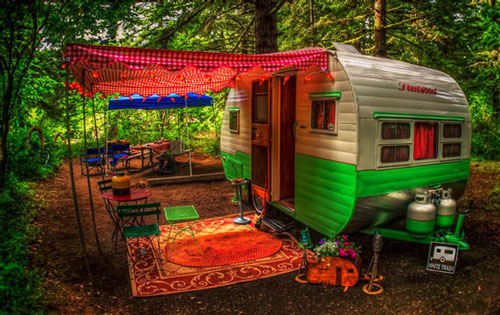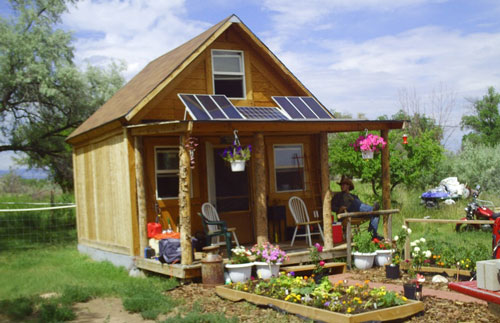How to Live Off Grid Successfully
If you have been wondering how to live off grid – “is it really possible?” and “Can I do it?” the short answer to all of these questions is “Yes!”.
Remember: The only sure thing in life is transformation. There is another important rule of life that is often overlooked: “Anyone can only teach you what they know.” Learning is a lifelong process. The long answer is still yes, just with a lot more things to take into consideration. Living off grid will take a commitment of time, resources, and determination. You will really need to believe in what you are doing, have a vision for it, and want to make it work despite the obstacles that will plague you.
Living off Grid Takes Practice
Living off grid is not the easiest way to live. Until you do it you don’t even know the things that you are going to have to give up. The big things are easy to figure out: refrigerators, heating systems, television, kitchen appliances, and these are things you do not have to give up!
There are other things that many people don’t think about until they are actually in the midst of it. Like indebtedness, careers, local churches and schools. Sometimes families and friends.
It still takes money to live

There are probably more Americans living off the grid that are on SSD (Social Security Disability) than any other group. Most of them would tell you they love it, and would do it again in a heartbeat.
Having a small income makes all the rest of it possible, you then can develop an income program that puts the “icing on the cake” and improves your comfort zone. These parts of your personal economy are called self employment. This needs to be discussed in a separate letter, but it is easier than you think, and very financially rewarding.
There are a myriad of small electronics that people use daily that may not work with your new lifestyle. It isn’t that they are necessary objects, they are conveniences.
Yet, for many of us, convenience gives us the foundation of our lives.
If you are still thinking of living off grid then there are a few decisions to be made. What works for some is the awareness that getting by with less is a way to need less. Finding a comfortable zone to live in means having money left over, on pay day. Every time you could find a way to either live without or get for nothing it means more money in your pocket.
Designing an off grid home (RV or trailer lifestyle)

Your off grid location can be anywhere you want. Even were you are right now.
When you go off grid are you going to do it in your current home?
Will you need to move?
Will you choose to build a new home or restore an old one?
What part of the country will you choose?
Knowing how to live off grid in different environments will help you to make the choice that is best for you. The point is: living off grid is a collection of small things that you can do, that collectively change your life, to give you more of what you want and less control of your life by an unappreciative society, country or world.
If you think having a job, even a good job, is just another form of slavery, then you are a candidate to “live off the grid”. It’s your choice. It’s your life, and you have the right to live it the way you want. Making an ongoing list of small things to change and learning how to prioritize that list is a good place to start.
Going off grid where you live now
You might think that those questions are secondary but they are not. It is entirely possible to go off grid right where you live, if you own your own home or where you rent. In fact you can begin learning how to live off grid today. Become aware of how powerless you are in your present life because it will give you an insight into the changes you can make in your own life now!
A suggestion: This is not about religion, ask yourself “In whom do you place your trust?”
Interesting how many organizations and people are living off your pay check, not just your wife and kids, but your local municipal government, including police dept, fire dept, water and electric dept, tax office, sewer dept, all depend on you to support them.
Living off the grid starts with a change in attitude

Solar panels can be added. Circuits can be turned off. Water can be discontinued and wells can be dug. Research should be done into alternative forms of energy, appliances, and different ways to run a household when standard energy isn’t being used.
Some want to keep it simple, rent a place to park. It includes water, sewer and electric. It can work well for many years. It is harder to move off grid in a subdivision but it can be done, depending on your homeowner’s association and local policies.
The world is getting smaller, it is getting harder to find privacy.
It’s easier to move off the grid, when you park your motor home in an RV park and plug it in, or park in a spot and turn on your own generator or plug into their electricity.
Moving to a New Location
If you are planning to move then take the time to consider your needs, desires, and the various benefits and negatives of different parts of the country. For example, in Texas the benefit is apparent. The winters are basically mild. While we do get cold snaps they are interspersed with warmer weather. There are a total of three growing seasons. It doesn’t take a whole lot to stay warm in the winter if you can handle 50 to 60 Fahrenheit degrees.
Gardening
On the other hand, in Texas we can go two to three months in the summer without a drop of rain. This means that you will be hand carrying water to your garden. Summers are hot. Living without air conditioning when it is 110 outside is challenging, at least until you get used to it.
If you are going to make a move then you should consider areas where there are not extremes of temperature or of rainfall.
Things to Consider
The other important thing to consider is the locality.
Will you continue to work at a job?
If so, how long will your commute be?
How far can you afford to live from the place that you work?
Is the location you are looking at economically sound?
Will you have access to groceries, church, gasoline, medical care?
RV-ing around the country can be a great way to research these questions, while enjoying your younger years. Remember, we all get old and our needs will change.
All of these questions will need to be researched and answered before you begin to look at moving to a new location.
Learning How to Live Off Grid

Now that you have established where you are going off grid the question is how to do it. The best place to start is by analyzing all of your electrical usage for a month. Exactly how much electricity do you use on an average?
Most off grid systems cannot handle the load that modern man puts on them. You will probably need to cut back on your usage. The next thing to do, then, is to figure out how to cut back on your energy use. Will you use a propane stove or refrigerator? Wood stove?
If you choose to use a wood stove or heat will you have access to wood? How will you light your home in the evenings?
What type of solar do you plan to use? Is your home designed in such a way that passive solar can be used?
Types of Off Grid Energies
There are a number of types of energy for off grid homes:
– Electric power line
– Electric Solar
– Electric Wind
– Wood heat / cooking
– Electric Gas Generator
– Electric / heat / cooking Propane
– Water (micro-hydro)
– Geothermal
The biggest need will be for heat and cooking. Once you have those two things decided you are pretty much good to go. Cooking on a wood-stove is difficult for most people to adjust to but it can be done. Many people, once they learn to do it, would not go back to cooking in an electric oven! Conserving energy is one of the best ways to deal with your energy needs. Anyone can do that, no matter where they are.
What can I do today?
Start right where you are. Most people cannot afford to just go off grid one day. It is a process of both investing in the products needed and doing the research to gain the knowledge to do it. The second part is, were all different, and our want, needs and expectations need to be honored.
Tips for saving energy right now, conserve energy where you are

Use solar hot water heaters.
Use heat exchange units.
Caulk doors and windows.
Let your body acclimate to colder than normal or warmer than normal temperatures.
Get a clothesline and stop using the dryer.
Upgrade insulation.
If your refrigerator or freezer is over 10 years old, consider buying a new, energy efficient model, or even a propane one.
In other words, see how low you can go. Get rid of the electric clock radio, the power drill, and the microwave. Try to get the electric bill down to the bare minimum.
Evaluate your need for power
Once you get your electric usage under control you will be in a better position to see whether or not you will be comfortable going off grid completely. Even if you decide going off grid completely is not something you want to do, you will have learned how to save on your electric bill, and that is a big benefit.
Going off grid is not for everyone. It is really an investment in a much simpler lifestyle. It does not have to cost thousands of dollars. Just do what you can, where you can. Taking the steps slowly, researching, and learning how to live off grid will help you to make a smooth and successful transition if you decide that going off grid is for you.
The psychology of going off the grid
Living off the grid has nothing to do with being an environmentalist. It does have to do with living your own life, within your own economical means.
yogaesoteric
November 27, 2016
